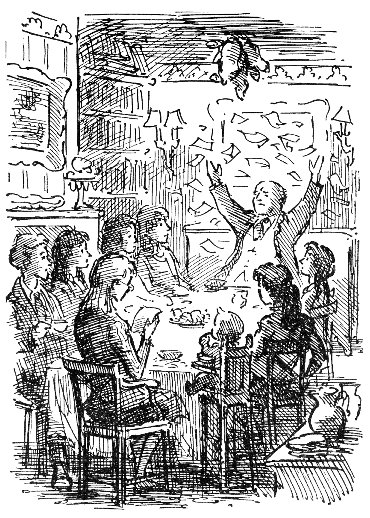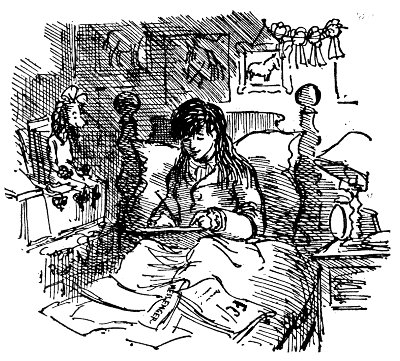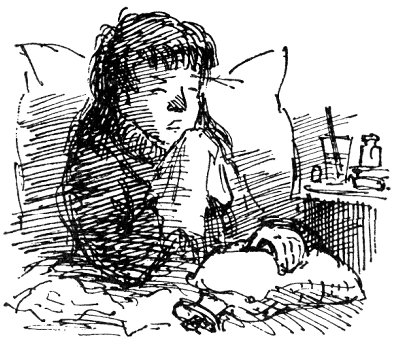"Daddy says that nowadays any schoolgirl of thirteen who writes a book is hailed as a genius. Well, I'm a schoolgirl and I'm nearly thirteen and though I don't think I am quite genius, I certainly wouldn't mind being hailed as one. Anyway, I've always wanted to write a book. The trouble before was that I had nothing really exciting to write one about—just school, and Friday (who is a year older) and my youngest sisters and my pony Gorse and my guinea pigs and what a nuisance grown-ups are. But of course those are what all the other geniuses of my age write about and I wanted mine to be a proper adventure story."So begins John Verney's 1959 novel Friday's Tunnel, which introduces the Callendar family: father Gus (Augustus), a newspaper columnist, who is married to Jan (January), an expatriot American who was once an art student in Paris. As February narrates, they decided "to carry on this calendar joke with their children," naming the eldest boy Friday for the day he was born on. February was born on a Sunday, so they named her after the month instead, and for subsequent children, tiring of the calendar, Gus and Jan named them in alphabetical order (Abigail, known as Gail; Beryllium, known as Berry; Chrysogon, "Chrys," and Desdemona, "Des").
It's hard not to love February after that introduction, and she is a most ingenious child: horse-mad as many girls of that age, a middling scholar, and continually amused by her brother's interests. At the time Friday's Tunnel takes place, he has become greatly absorbed in tunnels and is attempting to dig one through the chalk cliff at the rear of their property, Marsh Manor, a smallholding with a converted farmhouse, barn and outbuildings, just north of Chichester. Little does guess that Friday's building project will somehow intersect with a new mineral found on a small Mediterranean island called Capria (where, coincidentally, Gus was stationed during World War II), the officious Lord Sprockett and his madcap wife, a cottage called Deans, and the holiday tutor Gus has engaged for the summer to Friday's and February's dismay, a young college student named Robin Fawcett.
Friday's Tunnel is such a cracking great adventure story, mixing politics at the time with technological secrets and untrustworthy officials, that the first sequel is just slightly a letdown: February's Road involves the family with a lesser crisis that will prove more personal: a new trunk road, partially spurred by Gus's scathing newspaper columns about the need for good highways in Britain, will clip off half of the paddock and bring traffic past Marsh Manor and ruin some of the most beautiful stretches of the South Downs. February is accused of sabotaging the bulldozers about to start the clearing process and the whole family, including new little brother Hildebrand, plus Dr. Henry and his children Adam and Sasha, who were introduced in the previous book, become involved in the convoluted land deals that follow.
The first two books are narrated by February; however, in the third a chummy third-person narration serves as the story follows both February and Gail as they become involved in a youth movement called "ismo," which gives the name to the third book of the series. The Callendars are moving to Florence, Italy, for a year in connection with Gus' job and the special tutor that is engaged to teach Italian to both February and Gail, as well as two other students at her co-ed boarding school, embroils them all—including some surprising adults!—in the "ismo" movement, which seeks to keep peace in the world. Unfortunately "ismo" has been infiltrated by unscrupulous sorts who want to use it to make money—and the combination of art rackets, idealistic students, and an uninspired narrative method makes this the dullest of the books.
And alas, poor February. Becoming involved with "ismo," however good her intentions, marked the "beginning of the end" for her intelligent, delightful character. By the time Seven Sunflower Seeds rolls around, she is now infected by know-it-all teen disease and considers all adults stupid or untrustworthy, and those younger than her but old enough to disagree with her as appropriate targets for scorn. Sasha Henry, the "brainy" girl who helps February solve the mystery in February's Road has become a miniskirt-wearing, sarcastic "dolly bird" who plays "ismo's" idealism like a game. Together they unceasingly criticize the narrator of Seven Sunflower Seeds, Berry, who is now the age of February in the first novel.
Caprium rears its head again in this fourth book, intertwined with the mystery of a retired racehorse boarding at Marsh Manor (the Callendars are back from Italy), editor John Gubbins' boffin-in-training nephew Rupert, the machinations of "ismo" (now being used for bad ends) and, once again, Lord Sprockett, not to mention a new breakfast cereal, the poems of Edward Lear, and Gus Callendar's "Mame"-like aunt Sophie and the Callendars' less-than-helpful au pair, known to the family as "Mamzel." Aunt Sophie is a delightful character, but much of the novel is given over to poor Berry trying to figure out if her little brother's illness was caused by poison in the form of caprium and being proved wrong and right and wrong again.
The final book in the series finds the Callendars having sold Marsh Manor and living in the town of Querbury, where Berry gets involved in a movement to save the town's old maltings (a real-life project of John Verney). Rupert Gubbins reappears, as do several characters from February's Road, in particular Mike Spillergun, who now hosts an offbeat television series, and Peter Blow. The maltings was founded by the Samson family, and wayfaring Samuel Samson is rumored to have a treasure, the "Hoard" of the title, fabulous Incan artifacts, hidden somewhere on his property, once the home the Callendars have purchased. In addition, Gus is running for the town council, and Verney gets some sharp jabs in about small-town politics, not to mention small-town boys made good...or did they?
Something I found interesting about this last entry in the Callendar saga is that the eldest three might as well not exist any longer: February (who was engaged to Robin Fawcett at the end of Seeds), is mentioned only as "your eldest sister," Friday is mentioned only as having once been Peter Blow's friend, and Gail might have dropped from the face of the earth! It's as if now that they're grown Verney no longer has a use for them. Dr. Henry and his family are not mentioned, either, even though Berry is sick with glandular fever during a portion of the book—she's attended by another physician altogether.
The first two books are notable for containing Verney's delightful Edward Ardizzone-like illustrations in the text (Ismo only has chapter headers and the final books only cover illustrations). Here's a few:
The family at dinner after Christmas in February's Road:

Feb in bed after her accident in Friday's Tunnel:

And this delightful illo of Feb with a cold from February's Road:

Taken as a whole they are delightful portraits of middle-class English childhood forty years ago, but Friday's Tunnel is undoubtedly the best.
I'm at present reading John Verney's World War II memoirs, which are quite offbeat compared to the more serious experiences I've been reading about (Halsey's Typhoon, etc.). It's considered a classic British war memoir.
Here's a Telegraph article commenting on Friday's Tunnel.
John Verney supported the Farnham Trust and created something called "The Dodo Pad."
